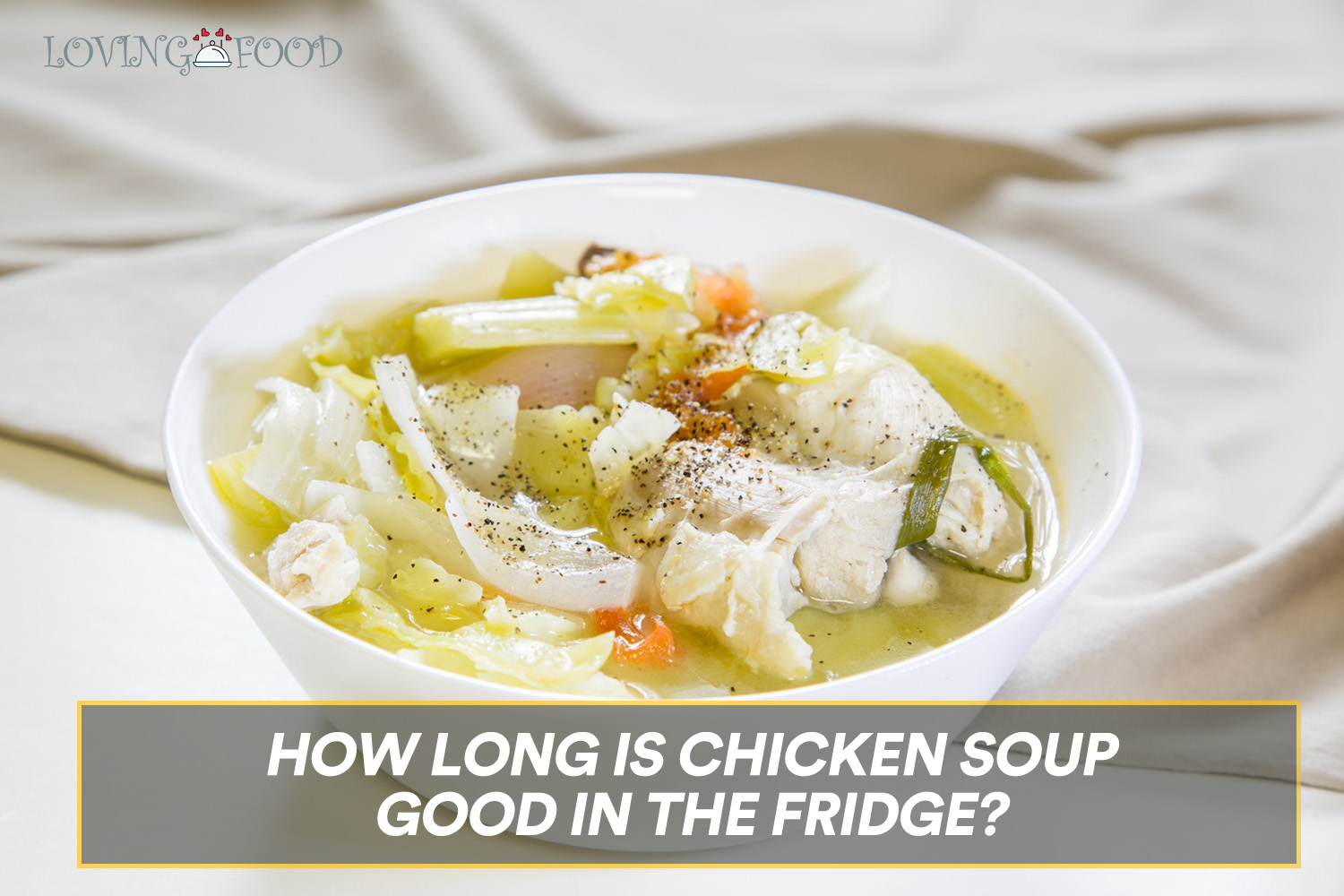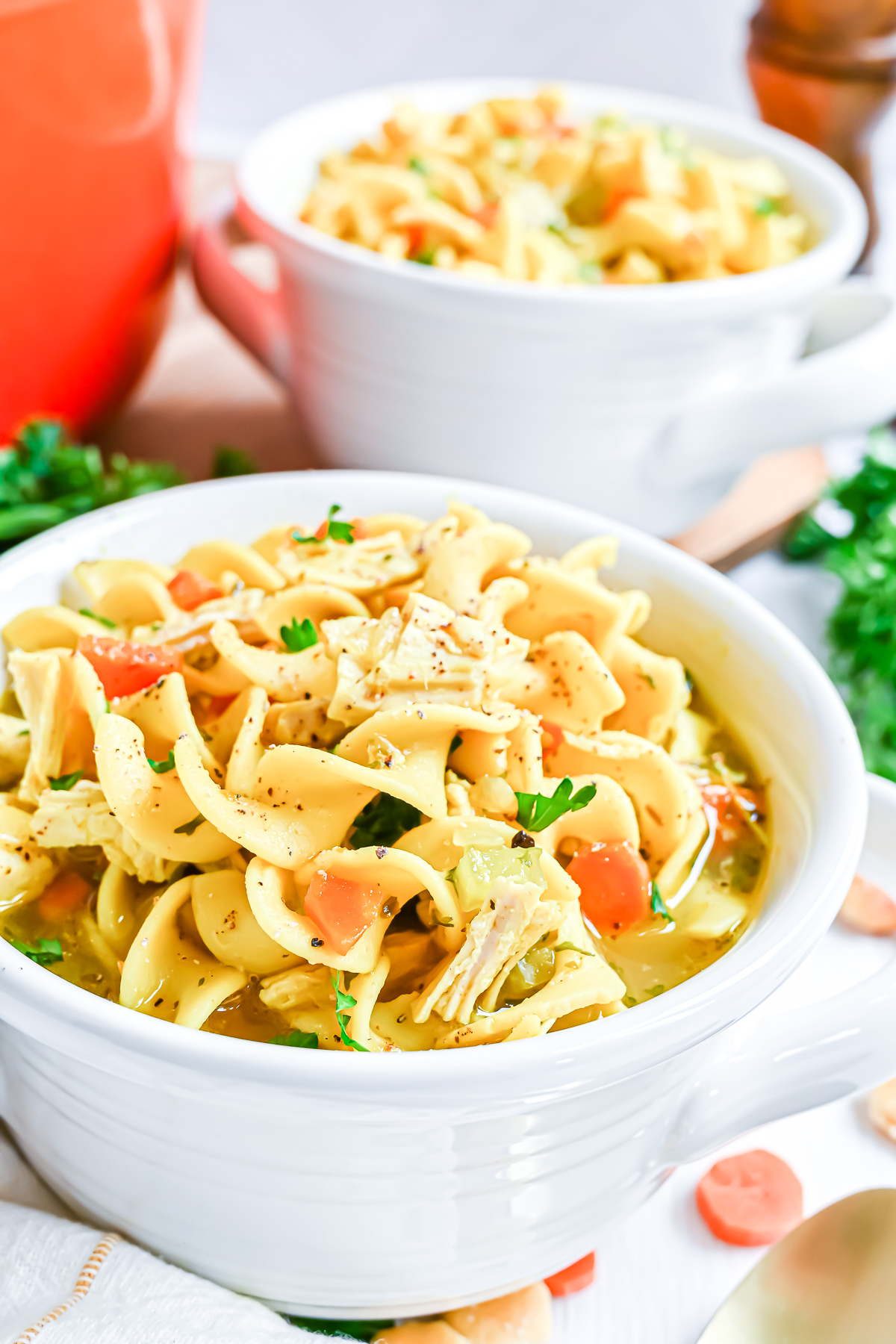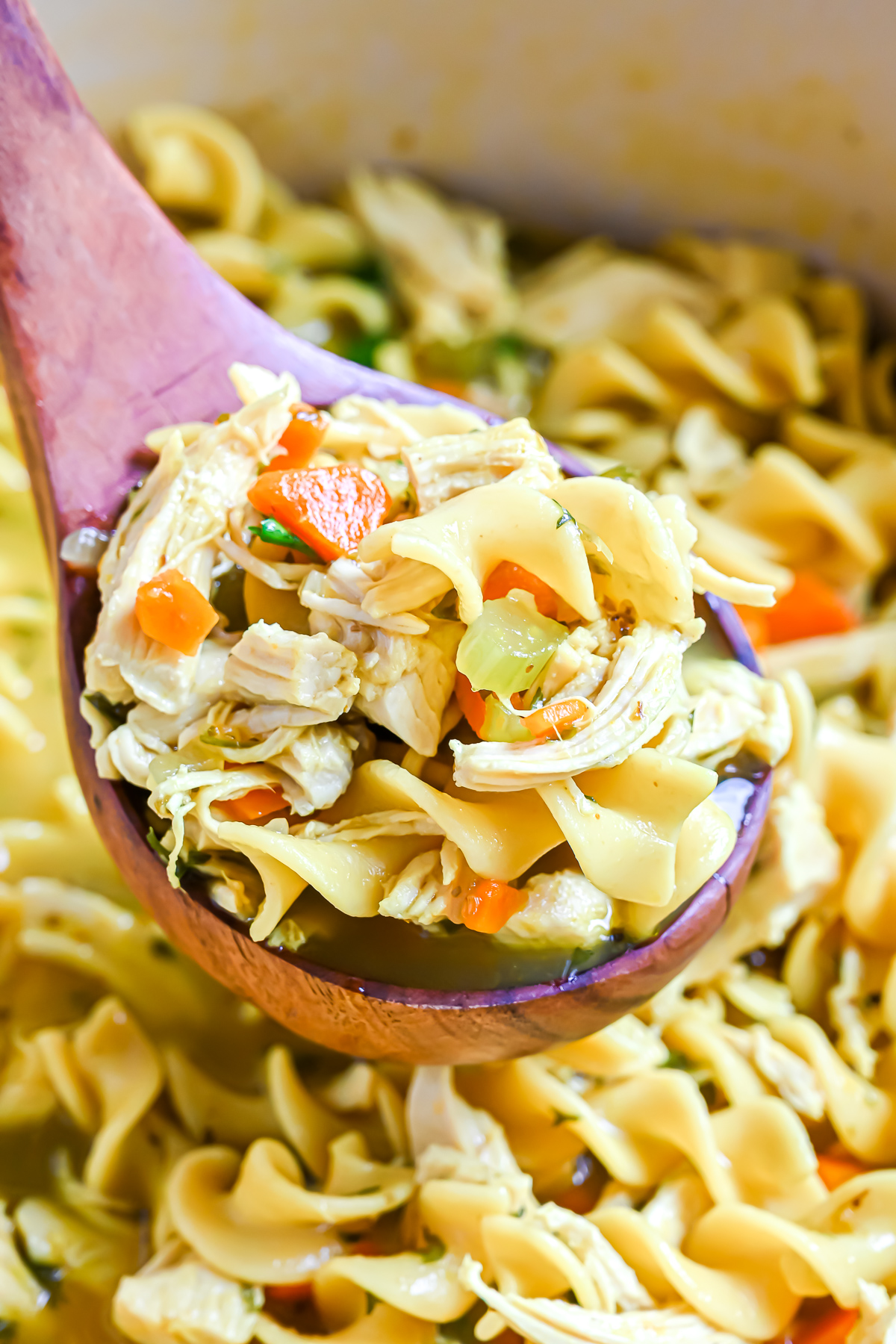Have you ever found yourself staring at that container of homemade chicken soup in your fridge, wondering if it’s still okay to eat? We’ve all been there! Chicken soup is one of those comfort foods that always hits the spot, especially when you’re feeling under the weather But knowing exactly how long it stays fresh can be tricky
In this comprehensive guide, I’ll share everything you need to know about chicken soup shelf life, proper storage methods, and how to tell when it’s time to say goodbye to those leftovers. Let’s dive right in!
The Refrigerator Timeline: How Long Will Chicken Soup Last?
The short answer? Properly stored homemade chicken soup will last 3 to 4 days in the refrigerator. This is the general rule that food safety experts agree on for optimal safety and quality.
But there’s more to the story than just a simple timeline. Several factors can influence how long your soup stays good:
- Ingredients used: Fresh ingredients will give your soup a longer shelf life than if you used leftover ingredients
- Handling and hygiene: How you handled the soup during preparation matters
- Storage method: Using airtight containers is crucial
- Refrigerator temperature: Your fridge should be 40°F (4°C) or below
I’ve found that some chicken soups, especially clear broths without cream or lots of starches, might last up to 5 days if properly stored. However, it’s always better to err on the side of caution when it comes to food safety.
The Danger Zone: Why Temperature Matters
Ever heard of the “danger zone”? It’s not just a highway to somewhere – it’s the temperature range between 40°F (4°C) and 140°F (60°C) where bacteria multiply rapidly in your food.
Leaving your chicken soup at room temperature for more than two hours can significantly increase the risk of bacterial growth. This is why cooling and refrigerating your soup quickly is super important!
Pro tip: Break your soup into smaller portions in shallow containers to cool it faster before refrigerating. This simple step can add days to your soup’s shelf life!
Recognizing When Your Chicken Soup Has Gone Bad
No matter how careful you are with storage, chicken soup won’t last forever. Here are the telltale signs your soup has spoiled:
- Sour smell: If it smells off or sour, trust your nose and toss it
- Slimy texture: A viscous or slimy consistency is a definite no-go
- Visible mold: Any mold growth means immediate disposal
- Unusual color: Significant color changes indicate spoilage
- Off taste: If it tastes sour or bitter, don’t risk it!
I once thought I could salvage a batch of chicken soup that smelled “just a little off” by boiling it again. Big mistake! Reheating won’t destroy all toxins produced by bacteria, and food poisoning is definitely not worth the risk.
Freezing Chicken Soup: Extending Shelf Life
Don’t think you’ll finish your chicken soup within 3-4 days? Freezing is your best friend! When properly frozen, chicken soup can last for 2-3 months without significant quality loss.
Here’s my tried-and-true method for freezing chicken soup:
- Cool the soup completely before freezing
- Portion into freezer-safe containers or bags
- Leave about 1 inch of headspace (soup expands when frozen)
- Label clearly with contents and date
- Store at 0°F (-18°C) or below
A little freezer tip: I like to freeze soup in silicon muffin tins first, then pop out the frozen “soup pucks” into a freezer bag. This gives me perfect single-serving portions that thaw quickly!
Properly Cooling Chicken Soup
The way you cool your soup can make a huge difference in how long it stays fresh. Many people make the mistake of just putting a hot pot of soup directly into the refrigerator, which can:
- Raise the temperature of your fridge
- Create condensation that promotes bacterial growth
- Lead to uneven cooling (the center stays warm longer)
Instead, try this method:
- Transfer soup to shallow containers
- Let it cool at room temperature for no more than 1-2 hours
- Cover loosely during cooling to prevent contamination
- Once cooled, seal tightly and refrigerate
For large batches, you can also use an ice bath method: place your pot of soup in a larger container filled with ice water and stir occasionally to speed up cooling.
Different Types of Chicken Soup and Their Shelf Life
Not all chicken soups are created equal when it comes to shelf life. Here’s a quick breakdown:
| Type of Chicken Soup | Refrigerator Shelf Life | Freezer Shelf Life |
|---|---|---|
| Clear chicken broth | 4-5 days | 4-6 months |
| Chicken noodle soup | 3-4 days | 2-3 months |
| Creamy chicken soup | 2-3 days | Not recommended |
| Chicken rice soup | 3-4 days | 2 months* |
*Note: Rice may become mushy after freezing and thawing
Creamy soups with dairy products generally have a shorter shelf life and don’t freeze well due to separation issues. If your recipe contains cream or milk, consider adding these ingredients only when reheating if you plan to freeze portions.
Reheating Chicken Soup Safely
Proper reheating is just as important as proper storage. Follow these guidelines for safe reheating:
- Stovetop method: Bring soup to a rolling boil, then simmer for at least 3 minutes to kill any bacteria
- Microwave method: Heat in intervals, stirring between each to ensure even heating until steaming hot (165°F)
- Only reheat the portion you plan to eat
- Never reheat soup more than once
I’ve noticed that stovetop reheating tends to preserve flavor better than microwaving, especially for broths and clear soups. But when I’m in a hurry, the microwave works just fine!
FAQs About Chicken Soup Storage
Let’s address some common questions about chicken soup storage:
Can I eat chicken soup after 5 days?
While some sources suggest chicken soup can last up to 5 days, food safety experts generally recommend consuming it within 3-4 days. If your soup still looks and smells fine on day 5, use your judgment, but know there’s increased risk.
Does reheating kill all bacteria in chicken soup?
Reheating to at least 165°F (74°C) will kill most bacteria, but some bacteria produce toxins that are heat-stable and can still cause illness even after the bacteria are killed. This is why proper storage before reheating is critical.
Can I leave chicken soup out overnight?
No! Leaving chicken soup at room temperature overnight puts it in the “danger zone” for bacterial growth for far too long. Always refrigerate within 2 hours of cooking.
Can I add fresh vegetables to chicken soup that’s been in the fridge for a few days?
You can add fresh vegetables to stored chicken soup that shows no signs of spoilage, but remember that the clock resets—the entire batch should be consumed within 3-4 days from when you add the veggies.
Can I refreeze thawed chicken soup?
Generally, refreezing thawed chicken soup is not recommended. Each thaw introduces another opportunity for bacterial growth, increasing food safety risks, and the quality will suffer.
Best Containers for Storing Chicken Soup
The container you choose for storage can impact how long your soup stays fresh:
- Glass containers: Excellent option that won’t absorb odors or stains
- BPA-free plastic: Good alternative that’s lighter than glass
- Freezer bags: Great for freezing in space-saving flat packages
- Mason jars: Perfect for refrigeration (leave headspace if freezing)
I personally prefer glass containers for fridge storage and freezer bags for long-term freezing. The bags allow me to freeze the soup flat, which saves space and speeds up thawing.
Final Thoughts: Enjoying Safe, Delicious Chicken Soup
Chicken soup is more than just food—it’s comfort in a bowl, especially during cold seasons or when you’re not feeling well. By following proper storage guidelines, you can enjoy your homemade chicken soup safely and reduce food waste.
Remember the key points:
- Refrigerate promptly (within 2 hours of cooking)
- Store in airtight containers
- Consume within 3-4 days or freeze
- Trust your senses—if it looks or smells off, throw it out
Nothing beats the satisfaction of making a big batch of chicken soup and knowing you’ll have delicious, nourishing meals ready to go for days. With these storage tips, you can maximize both safety and enjoyment!
What’s your favorite chicken soup recipe? Do you have any special storage tricks? We’d love to hear from you in the comments!

Best Practices for Storing Homemade Chicken Noodle Soup
To ensure your homemade chicken noodle soup remains safe to eat and retains its best quality, follow these simple steps:
- Cool the Soup Completely. After cooking, let your soup cool to room temperature before transferring it to the refrigerator. Be sure to do this within two hours of cooking to minimize the risk of food poisoning. You can speed up the cooling process by transferring the soup to smaller, shallow containers.
- Avoid Hot Storage. Never put hot soup directly in the fridge, as it can raise the temperature and potentially spoil other foods.
- Airtight Containers. Use airtight containers to prevent moisture and air from getting in, which can cause the soup to spoil faster. – **Material:** Glass or BPA-free plastic containers are ideal. Avoid storing soup in metal containers, as they can affect the flavor over time.
- Date the Container. Label your container with the date you made the soup. Homemade chicken noodle soup typically lasts 3 to 4 days in the refrigerator, so its essential to keep track.
- Refrigerator Temperature. Make sure your refrigerator is set to 40°F (4°C) or below. This optimal temperature slows down the growth of bacteria, keeping your soup safe to eat for longer.
- Avoid Contamination. Always use clean utensils when serving or handling the soup to avoid introducing bacteria. Avoid tasting the soup directly from the storage container to prevent contamination.
- Reheat Safely. Bring the soup to a simmer over medium heat to ensure its heated evenly when reheating. This is especially important for creamy soups or soups with egg noodles that might have absorbed a lot of liquid.

A few days after making that bowl of soup, you should check for signs of spoilage.
- Sour Smell or Off-Odor. One of the first signs of spoilage is an unusual, sour, or unpleasant smell. If your chicken noodle soup smells off in any way, its best to discard it.
- Appearance Changes. If the broth looks cloudy, has changed color (e.g., darker or greenish), or has a strange film on the surface, it could indicate bacterial growth. Visible mold on the surface or around the edges of the container is a clear sign of spoilage. Even if mold appears in only one part, the entire soup should be thrown out.
- Texture Changes. If the noodles, chicken, or broth feel slimy or sticky, this strongly indicates that the soup is no longer safe to eat. While some separation of broth and ingredients can be normal, excessive or unusual separation can indicate spoilage.
- Unusual Taste. If the soup tastes sour, bitter, or simply not how it should, its a sign that it has spoiled. Always taste cautiously if youre unsure about the soups freshness.
How Different Types of Noodles and Ingredients Affect Soup Storage
The type of noodles and ingredients used in homemade chicken soup can significantly impact its shelf life and freezing methods. For example:
- Egg Noodles. These tend to absorb more liquid, becoming mushy when reheated after freezing. If you plan to freeze the soup, consider cooking the egg noodles separately and adding them fresh before serving for the best quality.
- Hearty Ingredients. Using ingredients like whole chicken, chicken thighs, or homemade chicken stock generally holds up better during freezing than creamy soups or milk-based soups, which can separate upon reheating.
- Fresh Herbs and Vegetables. While adding a burst of flavor, these can lose their texture over time, especially when frozen. For best results, add fresh herbs after reheating the soup.

